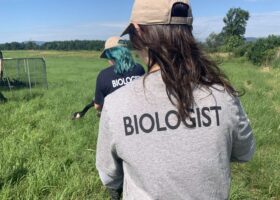
Weekly Reflections from a Summer at VCE
Working with VCE this summer has been immensely rewarding, seeing the animals I love in person and seeing how environmental disturbance affects them in real life. Birds hold a special place in my heart (I have a somewhat unattainable goal of seeing every species in North America before I die), and I’m proud to say I added 42 new birds to my Life List this summer.
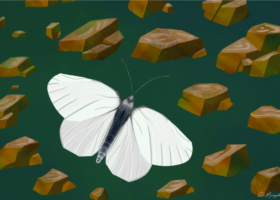
Searching for Butterflies: The West Virginia White
As VCE’s Spatial Science Intern, I spent my summer working with community science observations from several platforms, such as eButterfly and iNaturalist, to create a species distribution model for the West Virginia White in the state. This model incorporated bioclimatic variables and host-plant distributions to reveal areas within Vermont that may be suitable for these butterflies today and into the future.
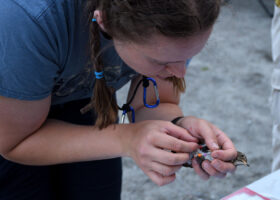
Mount Mansfield 2024 Midseason Report
With six trips up to Mount Mansfield’s peak and five trips to Mount Washington under our belts, VCE’s banding team is well into our summer 2024 montane bird banding and monitoring efforts! Battling rain, wind, chill, and scorching heat has been the baseline for this summer, but although perfect weather has been elusive, the birds we seek have not.
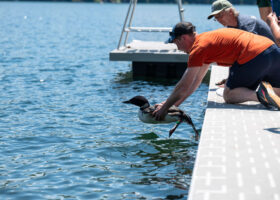
Lead Poisoning and a Love Triangle: A Tale of One Common Loon’s Brush with Death
Nothing prepares you for your first close encounter with an injured loon. Thanks to countless individuals, this loon’s tale has a happy ending. However, its journey touched many, demonstrating that conservation on all scales requires a village of curious, passionate people.
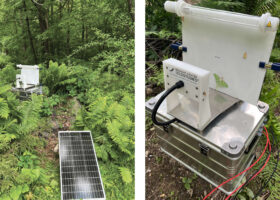
Building an Automated Moth Monitoring Network
How are moth populations faring in Vermont? Except for a few species, no one really knows. A few years ago, VAL teamed up with community scientists, biologists, engineers, and computer scientists from around the world to change that. Now, we are poised to understand moths like never before.
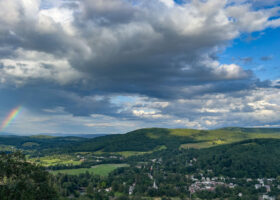
Field Guide to July 2024
The dawn bird chorus now fades from northern woodlands as the hills erupt in the sparkle and drama of summer insects. Dragonflies dart through fields and along pond edges. Moths and butterflies in all shapes and hues flit across the sun-washed landscape. In July, Vermont’s hills and valleys pulse with the rhythm of wildlife antics. Here’s a guide to some of the splendor.
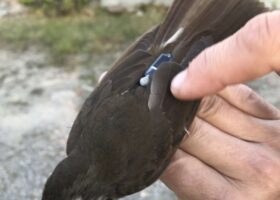
The Next Generation of Mt. Mansfield Ridgeline Research at VCE
With all the buzz on bees and other pollinators lately, you may be wondering if VCE is still studying birds. Are we ever! Amongst the plethora of continuing and new research, our Bicknell’s Thrush research program is going strong and has expanded to explore additional questions and build on past discoveries.
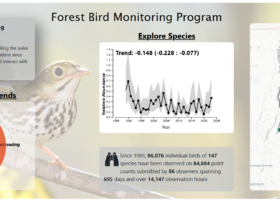
Forest Bird Monitoring Data Dashboard Goes Live
For over 30 years, VCE has coordinated the Vermont Forest Bird Monitoring Program to track the long-term population trends of interior forest birds. The backbone of this project is the dedicated corps of volunteer birders. The data these hardy birders collect are invaluable in tracking the status of forest songbirds. Now, the FBMP has a Data Dashboard where anyone can explore and interact with FBMP data and view up-to-date results.
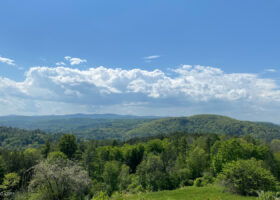
Field Guide to June 2024
Here in Vermont, we dream of June during the darkest days of January. Verdant wooded hillsides glowing brightly under a robin egg sky. Warm afternoon breezes roll through the valleys as we lounge by the clear waters of a cold river. Choruses of birds wake us each morning. The smell of freshly cut grass wafts through the window. Enjoy this guide to some of the month’s delights as the dream of June comes true.
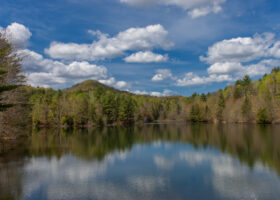
Field Guide to May 2024
The month of May is a show-off. Birds arrive on southern winds and liven the dawn with their chorus. Trees flower, and leaves burst from long-dormant buds. As pools and lakes awaken with new life, woodland wildflowers jump out of the ground to attract the attention of butterflies. Here’s your monthly guide to a month that shouts of life and rejuvenation.
